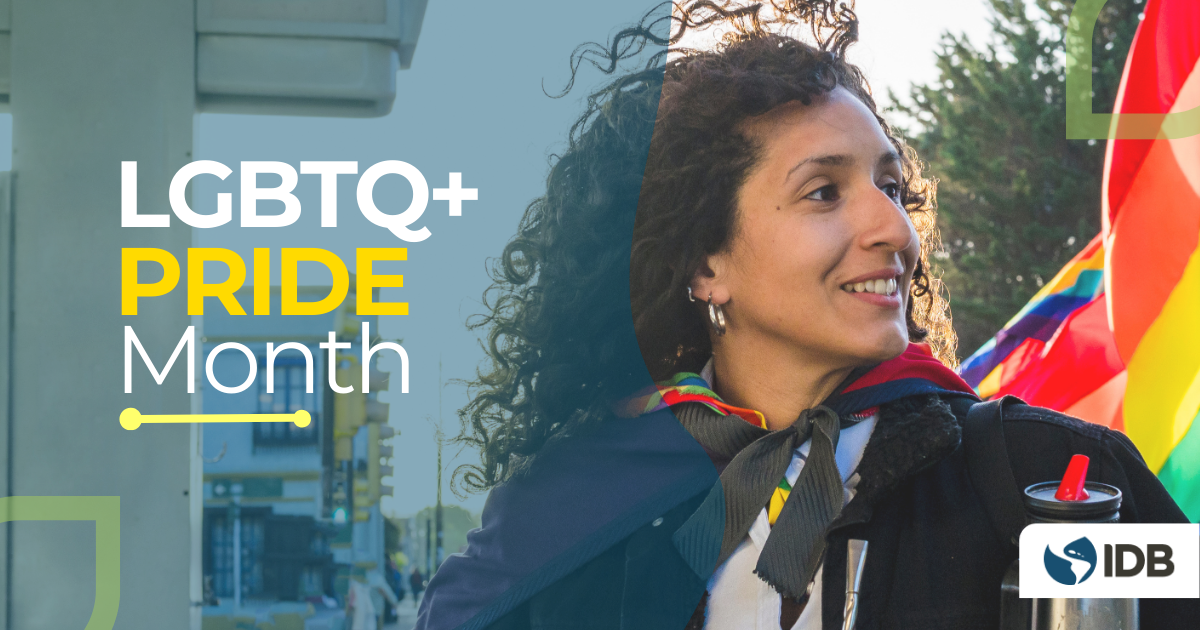The implementation of policies that guarantee the social and economic development of LGBTQ+ people and people with diverse sexual orientations and gender identities protects their individual rights, boosts economic growth and social development. Promoting their inclusion and preventing violence against LGBTQ+ people benefits the entire population and contributes to the progress of Latin America and the Caribbean. The Inter-American Development Bank (IDB) has recognized gender equality, diversity and inclusion as imperatives for inclusive development in the region.
To promote the social and economic inclusion of LGBTQ+ people, the capacities of those working on projects must be strengthened and visibility given to those who are already doing so. For this reason, the IDB’s Gender and Diversity Division promotes internal activities such as the “Rondas de Conocimiento” (Knowledge Rounds) on sexual orientation and gender identity (SOGI) and external events with counterparts already working on the issue.
Knowledge Rounds and their Lessons
The Knowledge Rounds are spaces at the IDB that seek to deepen the understanding of the barriers faced by LGBTQ+ people for their socioeconomic inclusion. The objective is to strengthen the capacities of internal teams to respond to the growing demand for technical support on these issues.
Four lessons from the Knowledge Rounds:
- LGBTQ+ people face specific barriers to inclusion. In education, a survey of students in Chile, Guatemala, Mexico and Peru revealed that around nine out of ten children and adolescents heard homophobic insults at school. This affects the academic performance, sense of belonging to the educational institution and mental health of LGBTQ+ students, which can result in higher school dropout rates. In the work environment, LGBTQ+ people experience discrimination both in selection processes and at work and after disclosing their sexual orientation or gender identity. In Ecuador, 67% of trans people have experienced discrimination or violence at work. Prejudice and bias increase the vulnerability of LGBTQ+ people to be victims of violence. Between 2014 and 2020, 72% of homicides of LGBTQ+ people in ten countries in the region were motivated by prejudice related to sexual orientation or gender identity.
- Good practices start with prevention programs. In education, “Yo quiero, yo puedo… Prevenir la violencia” (I want to, I can… Prevent violence) is a bullying prevention and mitigation program in schools. This initiative has been implemented in Mexico and consists of training teachers to address bullying and improve their capacity to reduce violence and strengthen students’ psychosocial tools. This type of program is often combined with other good practices, such as the implementation and reinforcement of institutional policies that recognize diversity and explicitly prohibit bullying on the basis of SOGI.
- Data is key to identifying and overcoming barriers for LGBTQ+ people. In the area of transportation, it has been proven that gender and gender expression directly affect people’s mobility. In the framework of the “MiBus” energy transition project in Panama, the IDB promoted a study that concludes that 70% of LGBTQ+ people experienced harassment situations in transportation, compared to 29% of non-LGBTQ+ people. On the other hand, while 30% of LGBTQ+ people received insults, mockery and humiliation, only 6% of non-LGBTQ+ people did. This type of data, which is elaborated in the framework of the projects, is key to promote education and awareness-raising actions to prevent violence, such as those designed in the framework of the “Line 2” project of the Bogotá Metro, which is being promoted with the support of the IDB.
- Promoting safe and supportive environments is critical for LGBTQ+ inclusion. The IDB developed a Guide to Support the Design and Implementation of Measures to Prevent and Address Gender and Sexual Orientation Discrimination in Safeguard Policies, which is a pioneer in the field of multilateral organizations. This guide is fundamental to identify disproportionately negative impacts for LGBTQ+ people that arise after the development of projects and to design prevention and mitigation measures.
The Knowledge Rounds are crucial spaces for reflection and training that allow IDB teams to be better prepared to respond to government requests for support. They are thus able to address the specific needs of LGBTQ+ people.
Pride in Being Who We Are: More Opportunities for LGBTQ+ People
While the Knowledge Rounds are internal IDB spaces, in June 2024, an open outreach event was held in commemoration of LGBTQ+ Pride Month. During the broadcast, knowledge and lessons from practices and projects with and for LGBTQ+ people from three countries were shared: Mexico, Bolivia and Ecuador. Listen to the interventions in the video below:
With these initiatives, the IDB reaffirms its commitment to gender equality, diversity and LGBTQ+ inclusion as imperatives for sustainable development. The good practices and lessons learned become key tools that guide us towards a more inclusive and equitable future for all people.


Leave a Reply